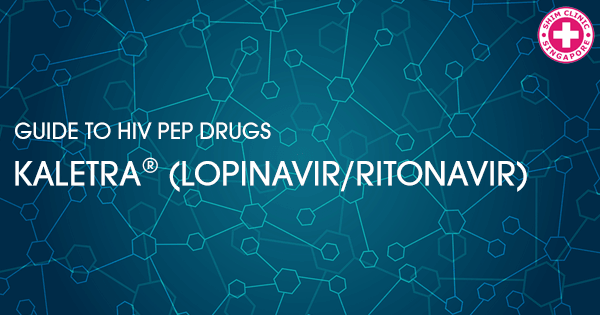The HIV PEP designer drug Kaletra® (LPV/r) contains the two HIV viral protease inhibitors lopinavir (LPV) and ritonavir (RTV) [Norvir®]. Developed by Abbott laboratories in 2000, it is referred to as a designer drug as it was specifically formulated based on X-ray crystallography structures to specifically target the HIV protease.
Both lopinavir and ritonavir inhibit the viral protease, but the genius behind Kaletra® is the combination dose that allows the two drugs to work in synergy. Ritonavir has toxic side effects at the levels required for it to inhibit the protease on its own while lopinavir struggles to maintain biological activity in the body. Abbott Laboratories discovered that at low dose ritonavir increases the activity of lopinavir by increasing the amount of the drug that remains biologically active and able to inhibit the HIV protease. The combination drug Kaletra® is able to produce a greater effectiveness at a lower dose for both drugs than they are able to achieve on their own.
Side effects
The lower dose in Kaletra® does reduce the side effects but does not eliminate them. Common side effects from Kaletra® include nausea, headaches, muscle pain particularly in the back, vomiting, dizziness, heartburn, redistribution of weight from limbs to the torso and itchy skin. Severe and even fatal allergic reactions have been seen with this drug and it is advised to seek emergency medical assistance should a skin rash appear on taking Kaletra®.
Contraindications
Kaletra® like many medications can stress the liver. If you have liver disease you should check with your doctor prior to taking this medication. Yellowing of the skin and eyes (jaundice) is an early warning sign of liver damage. Seek medical assistance should you notice jaundice appearing. Diabetes is another condition that needs to be monitored carefully while taking Kaletra®. Irregular heart beat may occur and patients with pre-existing heart conditions should be closely monitored.
The drug can cause an increase in sugar levels so care should be taken to monitor levels carefully in diabetics. Those who are not diabetic can start to show symptoms similar to diabetes while on this drug. Watch for increased thirst, increase in the need to urinate, fatigue, dizziness, fainting, blurred vision and fruity smelling breath. Hyperglycaemia (too much sugar in the blood) if unchecked can lead to coma and death even if the patient is not diabetic. Patients with pancreatitis, haemophilia and low potassium levels should also speak to their doctor about possible alternatives.
Pregnancy or breastfeeding should always be discussed with your doctor before starting any new medication. It is not advisable to take Kaletra if breastfeeding and a different dosing strategy is required during pregnancy.
Drug interactions
As well as complicating existing medical conditions and uncomfortable side effects, Kaletra® interacts with other drugs. Your doctor will provide you will a full list should you start taking this drug and you should advice of all drugs you are taking including herbal remedies. Kaletra® is known to interact with hormone treatments and decrease their efficiency, the pill may not work as well and extra care such as using condoms is advised as contraception while using this drug. Herbal remedies can contain strong drug compounds. It is not advisable to take St John’s wort for example while on Kaletra®. Your doctor or pharmacist can advise you on other herbal remedies that you may be taking.
Additional information
The development of Kaletra® has not been without its share of controversy. The patent held by Abbot Laboratories will not expire until 2016. The expense of the drug led the Thai government to ignore the patent and authorise the import of generic versions in 2007, reported in the Financial Times (By Amy Kazmin in Bangkok and Andrew Jack in London March 17, 2007). Abbott Laboratories responded by removing their drug from the Thai market, with resulting backlash from global NGOs. Attempts by India to follow suit left them with an inferior product (Financial Times, Andrew Jack, August 1, 2008).
The funds required to research and develop a drug such as Kaletra® are not small. Designer drugs such as Kaletra® where expensive and time-consuming studies are performed are a risky enterprise. Most designer drugs fail, either due to function or to toxicity in human trials. The patent laws are meant to ensure that the company that does the work benefits from the success of the drug. Some argue that this gives the company a monopoly and when that drug means the difference between life and death the company can in effect hold a person’s life ransom with the cost of the drug. It cannot be doubted that companies have done this in the past. From the point of view of the Thai government, they were doing what they thought necessary to save the lives of their people. From the point of view of Abbott Laboratories, they see a drug they have likely spent a decade and millions of dollars perfecting, being given to a competitor for free to profit from. The politics surrounding the global distribution of Kaletra® is a good example of the conflict between the needs of a business to be profitable and the needs of the people for treatment at a reasonable cost.
For more information see:
WebMD – Kaletra
http://www.webmd.com/drugs/2/drug-19939-542/kaletra-oral/lopinavir-ritonavir-oral/details#uses
Kaletra product information.


Pingback: HIV PEP drugs: Emtriva® (emtricitabine)